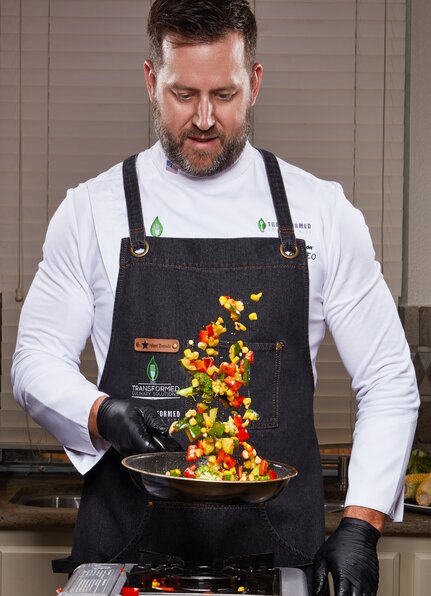This chef is transforming senior dining, one fresh veggie at a time
Senior dining has long had a bad rap. The phrase conjures images of unidentifiable purees, mushy canned vegetables and uninspired menus – far from fine dining.
But over the past few decades, a growing segment of the senior living industry has pushed for a higher standard, with experiences that rival the world’s best hotels and restaurants.
One of those industry pioneers is Darin Leonardson, a Dallas-based chef and President and CEO of Transformed Culinary Solutions, a senior living consulting company. His mission? Help communities transform their dining programs with high-quality ingredients, in-depth customer data and a dash of AI.

Darin had never intended to build his career in senior dining. In fact, his first job in the industry was purely by accident.
He’d applied for a chef position at a new “Tuscan villa” concept – but it wasn’t until he arrived on-site that he realized the venue was inside a new senior living property.
“I had all my chef friends say ‘No, you don't want to do that,” he remembers. “But then I was thinking about the place that they were building and the restaurant concepts and the research. And I was like, this looks very creative.”
The resulting restaurant allowed him to combine his fine dining skillset with an ambitious Mediterranean-inspired menu, even drawing local dining critics. The experience shattered his preconceptions about senior dining – and he hasn’t looked back since.
For Darin, working in the senior living segment isn’t just a career move – it’s a calling that aligns with his personal faith and values.
“I feel good because I'm fulfilling my purpose,” he says, “but then I'm having a lot of fun doing it because I love food and I love serving people and I love that experience.”
Darin is particularly passionate about giving seniors an elevated, dignified experience. He’s seen how transformative a dining program can be when it’s done well – and what happens when it’s not. One memorable site visit became the catalyst for Transformed Culinary Solutions.
He was shown to the dining hall, where residents were served a sad, one-size-fits-all meal with frozen vegetables and a monochromatic palette. There, he asked a nonagenarian named Mrs. Miller what she thought of the food.
“Young man, I'm 96. I lived in Fresno, California, my entire life,” he remembers her saying. “This is supposed to be the vegetable-growing capital of the United States, and this is the dog garbage that they're feeding me.”

DISCOVER THE FIRE
inside you


“We want to provide the client with something that we truly feel is revolutionary and can be transformative for their dining and their food operations."

Seeing how the food affected her quality of life, he went to the company’s CEO to propose big changes, starting with fresh produce. “It was so cool to see the transformation among 300 communities and 60,000 residents that I knew that we were impacting,” he says.
Through Transformed Culinary Solutions, Darin, along with business partner and chef Stephan C. Baity and their team, partner with senior living communities around the country on customized meal plans, staff development, and training in engagement, marketing and operations.
“We want to provide the client with something that we truly feel is revolutionary and can be transformative for their dining and their food operations,” he says.
Their goal is creating cost-effective, efficient kitchens, but more importantly, giving residents the delicious, nutritious food they deserve.
Darin quickly learned that senior dining isn’t as simple as transferring a high-end restaurant to a healthcare setting. Residents want good food, but they also want to feel like they’re at home, dining with friends and family.
“How we've become successful is we do sprinkle in a lot of ‘wow,’ ” he says, with specialty culinary events like cooking classes, demonstrations and “Iron Chef”-style competitions.
One way his team customizes the experience is with data gathered at the many communities Transformed Culinary Solutions serves. Residents are prompted to scan a QR code at the table, where they can rate and comment on the meal in front of them.
“What we use the data for is real-time fixes, from training of kitchen staff to never serving [a menu item] again or changing it with something better.”
AI is also a growing part of the company’s mission, used for creating video and photo content or developing new items and optimizing menus based on residents’ preferences and nutritional needs.
The result is a win-win – happy, healthy residents and satisfied stakeholders. And as his company grows, Darin can see the difference he is making in the industry for thousands of residents, one meal at a time.
“If I have the ability as a chef to change things, to make the food better and the presentation better and the service better, I think that that's why God put me on this earth,” he says.
